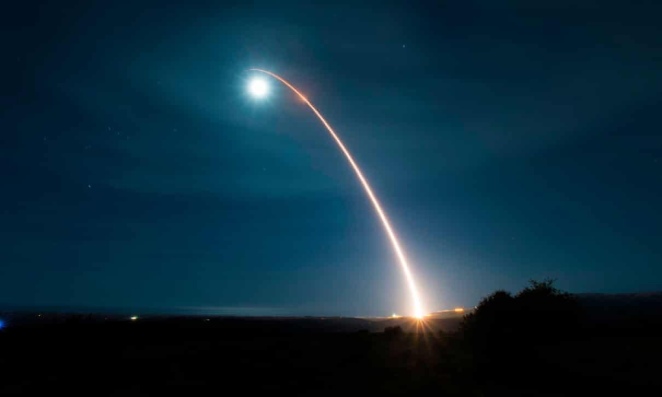US-Russia nuclear disarmament talks to begin, but no sign of China joining in
Uncertainty surrounds talks slated to begin in Vienna on Monday, with US desperate to get China to the table
Julian Borger in Washington
Sun 21 Jun 2020 04.37 EDT
The US and Russia will restart talks about their nuclear arsenals on Monday after a break of more than a year and uncertainty over whether Donald Trump is interested in salvaging arms control in the last four months before elections.
Trump’s new US arms control envoy, Marshall Billingslea will lead a delegation to meet the Russian deputy foreign minister, Sergei Ryabkov in Vienna, and has also asked for Beijing to send a representative.
“The United States has extended an open invitation to the People’s Republic of China to join these discussions, and has made clear the need for all three countries to pursue arms control negotiations in good faith,” the state department said.
Trump has been insistent that China join what has for decades been bilateral dialogue, but the Chinese government has refused. Its stockpile, currently estimated by the Federation of American Scientists at 320 warheads, is less than a twentieth the size of the US or Russian arsenal.
“The time is not yet ripe for China to participate in nuclear disarmament negotiations,” China’s foreign ministry spokesman said earlier this month.
Billingslea replied in a tweet: “China … should reconsider. Achieving Great Power status requires behaving with Great Power responsibility. No more Great Wall of Secrecy on its nuclear buildup. Seat waiting for China in Vienna.”
On the table at the expected two days of talks in the Austrian capital is the 2010 New Start treaty, which limits the number of US and Russian deployed strategic warheads (those mounted on long-range delivery systems) to 1,550 each. The treaty will expire next February but it can easily be extended for a further five years. Vladimir Putin has said he is ready to extend, but the Trump administration has yet to make a final decision.
US officials have said they want a wider agreement covering non-strategic weapons and even more stringent verification, as well as Chinese participation. Any such changes would require months, if not years to achieve.
“Clearly the administration is trying to find any way they can to put pressure on the Chinese to show up and engage. And the Chinese are clearly feeling no pressure to do this, nor do the Russians really want to play along,” said a US congressional aide. “So that part is going nowhere.”
America’s allies are lobbying the Trump administration to agree to an extension while encouraging China to join broader arms control negotiations. When Billingslea laid out his approach in a video conference presentation to a meeting of member state ambassadors at the North Atlantic Council (NAC), in May, there was little enthusiasm for the US approach
“He was very clear that President Trump was prioritizing trilateral arms control, and that he felt he had a mandate to go out and get this done,” a western diplomat said. “The allies very much want the administration to extend New Start, sooner rather than later. They’re worried that the administration is going to get overly focused on China, and not use this time to extend New Start.
“Those concerns were raised in a respectful way, and Billingslea was very clear that there had not been any decisions made yet on New Start,” the diplomat said.
The NAC meeting came the day after Trump had announced his attention to withdraw from another arms control agreement, the Open Skies Treaty, which allows Russia, the US and 32 other countries to make surveillance flights over each territory, with the aim of building conference and transparency. Trump pulled out on the grounds that Russia was violating the agreement by putting limits on overflights. European allies argued such infringements could be addressed and were not worth jeopardising the security benefits of the agreement.
“I think allies, really committed to doing what they could to bring you know to bring Russia back into compliance, so that the US would be able to consider walking back their decision,” the western diplomat said.
No comments:
Post a Comment